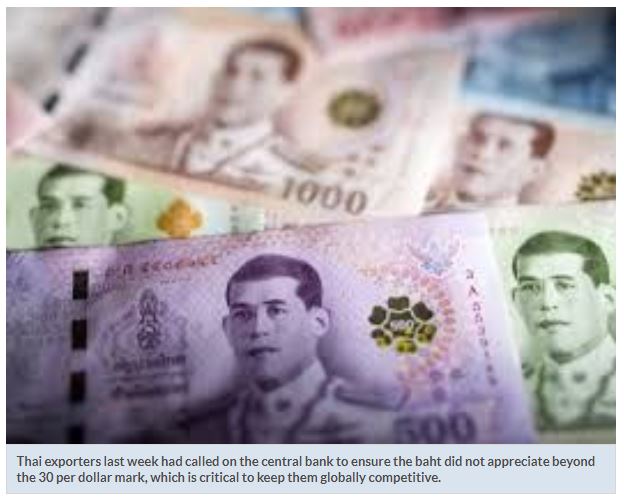Thai baht hits 7-yr peak as investors see central bank resistance slipping
BENGALURU: The Thai baht jumped to a more than seven-year high and breached a major resistance level on Thursday, as investors bet the country’s inclusion on a U.S. currency watch list might weaken the central bank’s determination to slow the currency’s gains.
The baht firmed 0.6% to 29.83 per U.S. dollar. Thai exporters last week had called on the central bank to ensure the baht did not appreciate beyond the 30 per dollar mark, which is critical to keep them globally competitive.
The Bank of Thailand said it did not see a big impact on foreign trade and investment after the country was added to a U.S. currency monitoring list along with Taiwan and India.
It added it had conducted two-way intervention only to ride out currency volatility and had no intention of using the exchange rate to gain an unfair trade advantage.
“I think in the near-term the central bank might refrain from heavily supporting the baht due to the report… by letting the baht dip below the 30 per dollar level today, it is a signal that the central bank will let it move more freely in line with its Asian peers,” said Poon Panichpibool, a market strategist at Krung Thai Bank said.
“The baht is going to be much stronger from now… I don’t think BOT will try to change that direction, but they will try to slow down the appreciation, such that exporters can hedge their FX risk.”
The Taiwanese dollar climbed more than 1% against a broadly weaker U.S. dollar, with its own central bank saying the move was a reflection of the island’s trade surplus with the United States.
The Indian rupee rose marginally. The Indonesian rupiah and Philippine peso were steady ahead of central bank meetings later in the day.
Economists by and large expect both banks to leave interest rates unchanged after aggressive policy easing this year to support their pandemic-hit economies.
In equity markets, South Korea’s KOSPI slipped 0.4% as the country reported a record daily jump in coronavirus deaths and cut its 2021 growth forecast.
Singapore shares shed about half a percent, after data showed the city-state’s non-oil domestic exports unexpectedly fell 4.9% in November from a year earlier. – Reuters


 Thailand
Thailand




